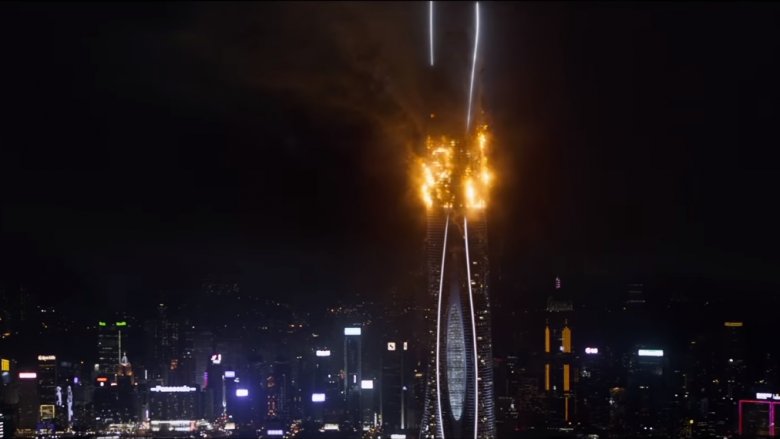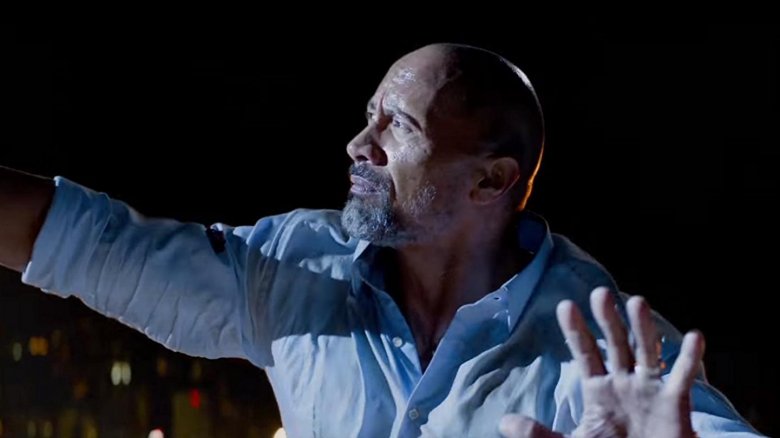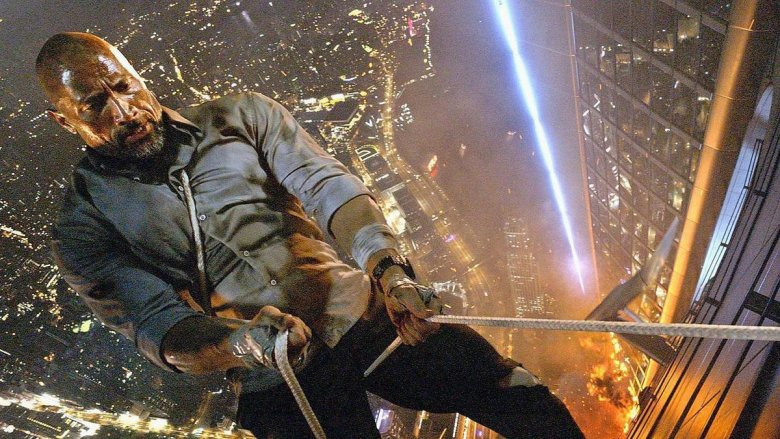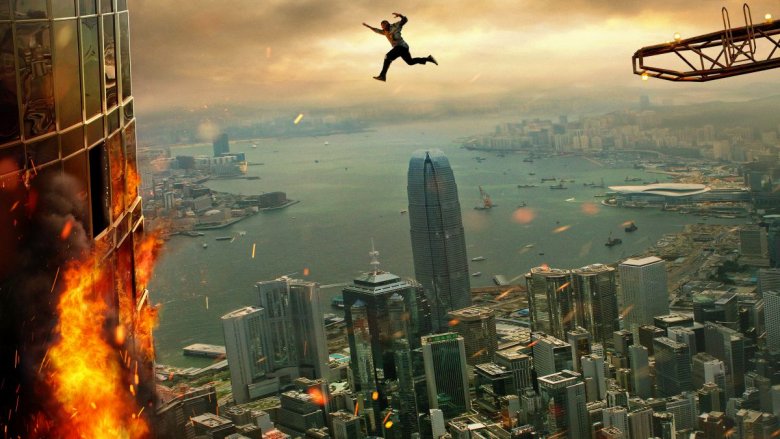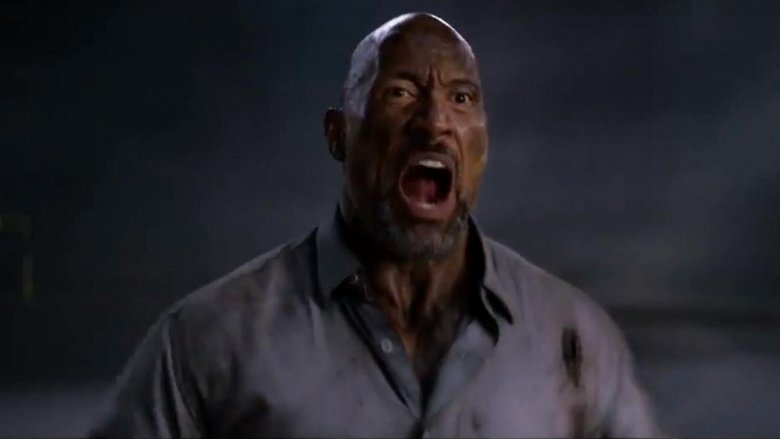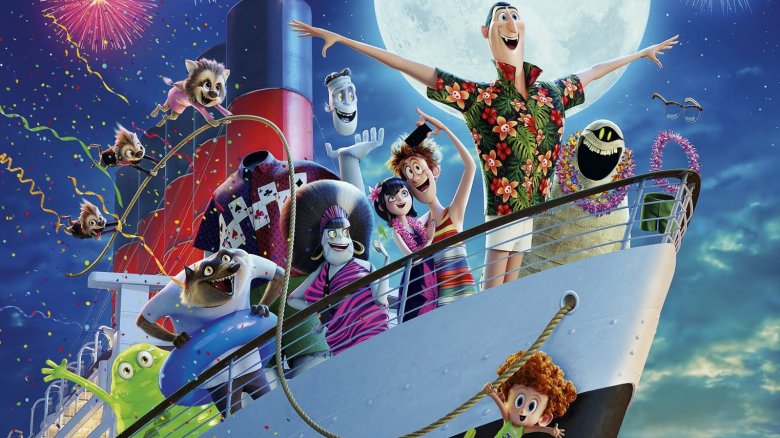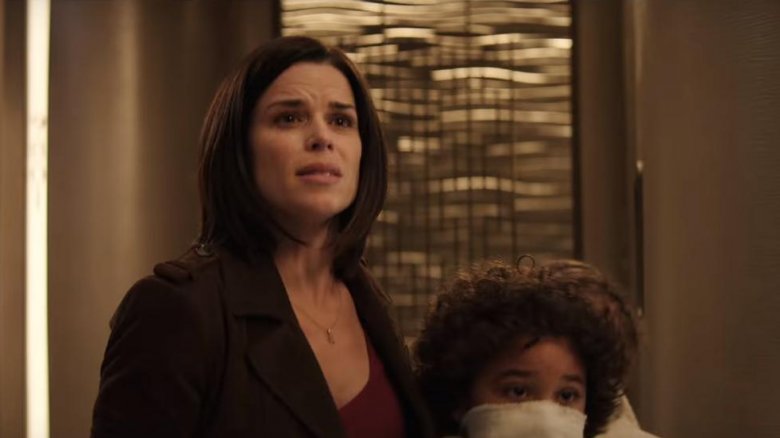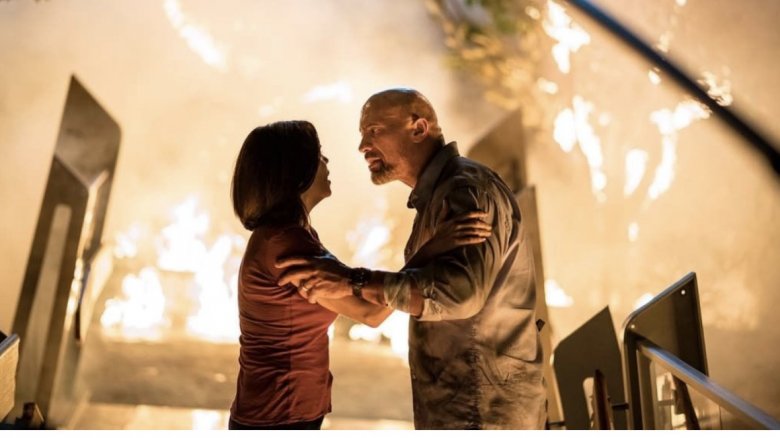The Real Reasons Skyscraper Bombed At The Box Office
We regret to inform you that Skyscraper has collapsed. Pitched as "Die Hard meets The Towering Inferno," the Dwayne Johnson-led action movie from the director of Dodgeball premiered to a significantly lower-than-expected financial reception, coming out of its first weekend in third place at the box office.
The throwback action thriller, which pays homage to the gutsy "one-man army" action movies made popular in the '80s, failed to generate much excitement among theatergoers, coming in behind Sony Pictures' animated Hotel Transylvania 3: Summer Vacation and the second weekend of Marvel Studios' Ant-Man and the Wasp. As a result, the would-be franchise starter will be lucky to make its money back, much less spark a new series. More likely than not, you can forget about a sequel already — this pilot balloon has popped. Now we just have to wait and see if anyone survives the landing.
So why is this disaster movie proving to be such a... disastrous movie? Could the Rock's star inexplicably be fading? Is the movie actually that bad? Let's tally up the damage and figure out the real reasons Skyscraper couldn't stand tall at the box office.
What's the damage?
The first part of any diagnosis is all about figuring out the patient's problems, and Skyscraper is coming out of its first weekend sporting more than a few. According to a breakdown by The Hollywood Reporter, Skyscraper only managed a domestic total of $25.5 million across 3,782 theaters, falling well below Universal's projected opening of $30 million or more. (A Box Office Mojo report from just before the weekend characterized that number as "an absolute low end.")
Against a budget of $125 to $129 million and a marketing budget of at least half of that, a $25.5 million domestic opening weekend is a pretty poor showing, one which Box Office Mojo now predicts will translate into a $65-$75 million domestic total. Since this doesn't even cover half of Skyscraper's likely total cost, that leaves the movie with a huge deficit to bridge in the international market just for the sake of breaking even. But with only $40.4 million coming in from global audiences during Skyscraper's opening weekend, the chances of even that happening are beginning to vanish.
No IP
One of the more unfortunate factors that Hollywood producers and accountants will certainly be looking at in assessing Skyscraper's failure is its lack of connection to any established intellectual property. Instead of being based off a comic book, anime, or young adult novel, Skyscraper is instead an original idea — or at least an original enough remix of established action movie tropes. When the Skyscraper blame game begins, the movie's inability to excite audiences will undoubtedly be placed, at least in part, on its lack of recognizable IP.
It's sort of a weird position for the movie to be in, considering that despite it technically being an original property, it doesn't exactly feel all that original. It's a worst of both worlds situation. While not based on anything in particular, Skyscraper is a self-aware pastiche of action movies past that's trying to start a franchise of its own, and any originality comes down to a matter of small differences.
In the broad strokes, this is still a movie designed to appeal to mass audiences, following a long-established template. As a result, the movie hasn't gotten many champions among people who prefer new stories to remakes, sequels, and franchise stuff, meaning its originality hasn't helped its cause at the box office. Anyone who really wanted something different during Skyscraper's release weekend probably went to see Sorry to Bother You, a downright weird, well-received, true original of a movie.
B-movie
While it's not a bad movie, according to the broad review consensus, Skyscraper isn't exactly a maligned classic that audiences are unjustly sleeping on. Instead, the movie has seemed to tally out as "just okay." As far as critics are concerned, opinions on the movie appear to be split right down the middle, leaving a prospective viewer to believe that they have about a 50-50 chance of enjoying the movie. If you're going to the trouble of shuttling your family out to the theater to see a movie, are you comfortable taking a coin flip, or are you looking for a sure bet?
Of course, that's just the critical reception, and critics tend to have standards. What do general audiences think about this thing? They seem to be calling it like it is, handing the movie a B+ Cinemascore in exit polling. That more or less means that the movie was what the people who saw it expected to see, and that they also thought it was pretty good. Nothing life-changing, not a great surprise, with little to get excited over. In a crowded cinematic landscape, B-movies need to offer a little bit of elevation to get people to come out — otherwise, exhausted audiences will stay home, wait five months, and catch the thing on streaming.
You seen this one before?
If Skyscraper feels too familiar to make time for, that's partially by design. Prior to the movie's release, Johnson described the movie on his social media as "a film that paid homage and respect to the classic action movies that inspired me and entire generations — Die Hard to Towering Inferno to The Fugitive."
But the thing about those classic action movies is not just that we've seen them all before, but that we've also already seen them all get ripped off pretty liberally. We've seen Cliffhanger, we've seen Speed, we've seen Daylight — some of us even saw Skyscraper, the Anna Nicole Smith Die Hard knockoff that went direct-to-video in the '90s. So as much as Johnson and the movie's producers would like to praise Skyscraper's originality, it's not a quality that feels all that earned. Technically it's original, but it still seems quite familiar.
It probably doesn't help that you could take the entire trailer for Skyscraper and substitute in clips from some of Dwayne Johnson's other recent movies, from San Andreas to Rampage to even Fate of the Furious, and come out with some teaser footage that looks more or less the same — which leads us to the issues with the movie's marquee star.
Over-exposed
One of the more troubling things about Skyscraper's performance is what it might foretell about the future — specifically the cinematic fortunes of Dwayne "The Rock" Johnson. In a 14-month span starting in April 2017, the actor has come out with The Fate of the Furious, Baywatch, the Jumanji sequel, Rampage, and now Skyscraper, and the avalanche of content shows no signs of stopping anytime soon. The performer has spent his whole career trying to prove his bona fides as a Schwarzenegger-level superstar, but not even Schwarzenegger had a run of leading roles that dense.
Even if you love the man in every role (which sounds downright dishonest, considering the existence of Baywatch) isn't it possible for there to be too much of a good thing going on with this streak of movies? It seems like he's starting to push it. With ten movies potentially coming down the pipeline for the actor in the coming years, from a third Jumanji, a couple of superhero joints, and a Fast and Furious spinoff, you'd have to be crazy not to think that we're at risk of some serious Rock fatigue. (If it happened to Star Wars, it can happen to the Brahma Bull.) Could Skyscraper inspire Johnson to tone down the full-court press? Maybe. After all, how is the country ever going to elect him president if the people are burned out on his movies?
The competition
Whatever its own faults may be, Skyscraper was also simply outmatched at the box office by more critically acclaimed competition. Which is not to say that the movies that beat Skyscraper are going on to win Oscars — they were just better received.
On the one hand, you've got Hotel Transylvania 3: Summer Vacation, another entry in the surprisingly successful Adam Sandler-led animated Dracula movie series. That family-friendly sequel won the weekend with $45 million, easily trouncing Skyscraper's debut showing. In second place, you've got Ant-Man and the Wasp cleaning up in its second weekend with nearly $29 million. While that may seem somewhat surprising for the relatively unambitious second Ant-Man movie, you've got to keep in mind that it's also the 20th Marvel Cinematic Universe movie — and that franchise has got its claws in everybody.
Down the line, the critical reception to Skyscraper's competition was better than that afforded to Skyscraper. The third Hotel Transylvania notched a 60% on Rotten Tomatoes across 67 reviews, while Ant-Man and the Wasp grabbed a pretty great 86% Rotten Tomatoes score across 241 reviews, both of them earning an A- Cinemascore in exit polls. In other words, people walked out of those movies feeling satisfied, and probably spreading positive word of mouth. Skyscraper — so far, at least — has proven more divisive.
Global spread
As much as Skyscraper was described as "Die Hard meets fill-in-the-blank," it also rightfully got pitched as "Die Hard in China," with the movie being a Chinese co-production that takes place in Hong Kong. Designed from the start to appeal to Chinese moviegoers, Skyscraper's reach for international relevance may have played into how American audiences reacted to it.
In order to make a movie palatable for a global audience, a movie's sense of personality tends to get diluted, with regional quirks falling away to mass-market blandness. Character is toned down in favor of things that can cross language barriers, and more emphasis is placed on universally appealing spectacle. Audiences don't exactly turn away from movies because they contain elements meant to appeal to foreign markets, but that tilting may well have diluted any of the more distinctive pleasures this movie could have had.
It's fitting that in the wake of Skyscraper's failure at the American box office, China has emerged as the movie's only hope — and despite its pandering to Chinese audiences, its success there is hardly a sure bet. The movie earned a little over $40 million across 57 international markets in its opening weekend, expanding to 11 more regions (including China) the week after. These are numbers that The Hollywood Reporter classifies as being disappointing. However the Chinese rollout works out, the rest of the world is shrugging at Skyscraper, and it's hard to describe that as being anything but bad news.
Catch it later
So does Skyscraper really deserve this belly-flop of a reception? Well, yes and no. As a movie, it's just fine — and while "fine" may be good enough for your dad to feel like he got his money's worth, it's not exactly something you can characterize as a success story.
Put simply, Skyscraper is not the kind of appointment viewing that makes you want to schlep out to the movies, regardless of how bombastic its special effects might be. Instead, Skyscraper is exactly the kind of thing you see on accident, whether killing time on a plane with an in-flight movie or lounging at a friend's house, watching along while they burn through an unambitious Netflix queue.
Multiple reviews from different writers emphasize the movie's nature as something slight and inessential — enjoyable enough as a nice diversion, but not good for much else. In a crowded movie landscape, "good enough" often doesn't cut it, especially for an average, just-fine movie like Skyscraper. In these days of razor-thin profit margins, if the stars don't line up just right, sometimes that's all you need to make a box-office bomb.
